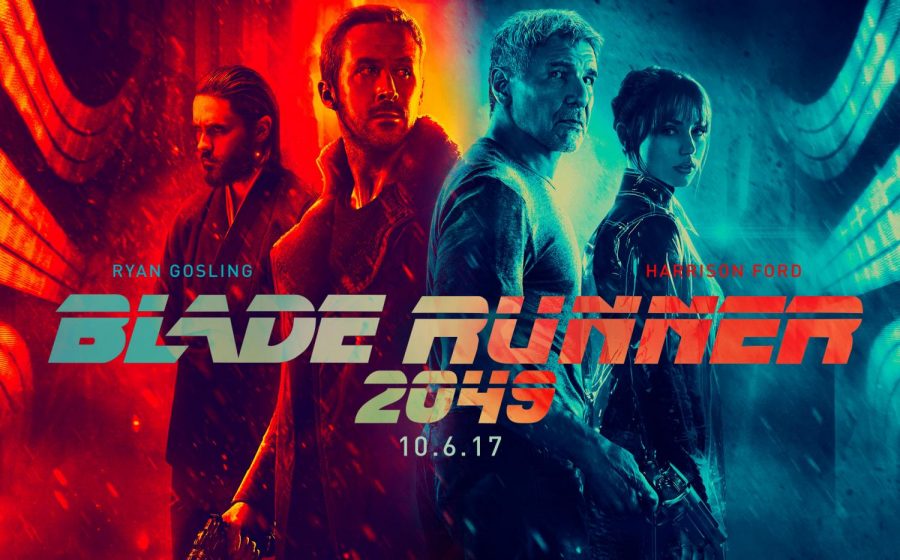“Blade Runner 2049”: A Modern Classic
Warner Brothers, Columbia Pictures
Theatrical release poster
October 10, 2017
Starring: Ryan Gosling, Harrison Ford, Sylvia Hoeks
Background: This film is technically a sequel to one of my favorite movies of all time: the 1982 classic “Blade Runner.” Set in futuristic Los Angeles, this movie chronicled the story of Rick Deckard, who is a “blade runner.” These are people who are assigned to track down and kill “replicants,” which are androids that function and appear as real human beings. This movie was far ahead of its time, tackling deep moral issues and bringing the true question of what is exactly human, which we still face today. Despite not performing well at the box office in its initial run, it gained a cult following, and it is regarded as one of the greatest movies of all time. Based on my description of the original, one would think that this movie is only meant to be a sequel cash cow, but it couldn’t be farther from the truth. As you’ll see in the following review, this movie is not only better than the original but also one of the best movies that have been created. It is a modern classic, and it is truly an incredible piece of filmmaking.
Cinematography:
Although I usually begin my reviews with an acting section, I must address the most important and essentially best aspect of this film: its cinematography. This is, by far, Roger Deakin’s best work, which says something considering his lengthy and award-winning résumé. The cinematography is truly a work of art in itself, such as the opening aerial shots of the film to the overviews of the dust-blown deserts and teeming neon chasms. This does the original film justice by accomplishing exactly what the original managed to do: create a milieu, a dystopian world, which is full of disease and commercials. A futuristic world grounded in reality. The use of color, textures, and objects in “Blade Runner 2049″ only accentuate the cinematography, giving the universe an extended feel of grit despite surrounded by all of this futuristic and essentially impossible technology. I believe that no matter what technology was to put in this film, it would still feel truly real, and this is aided greatly by the acting that I will discuss in the next section. It’s cyberpunk at its best, acting a true homage to the vision that Scott, the original director of the 1982 classic, had for this world.
Of course, the cinematography is not only the camera work and special effects of a film but also its soundtrack and use of audio cues. This aspect of the film might even be better implemented than the actual camera work. The music of the film further develops the identity of the work, and it also tells a story all on its own. “Blade Runner 2049″ is similar to its predecessor, specifically in its slow pace. Many of the scenes of the film are dialogue-heavy segments where the camera pans out, and this soundtrack brings more emphasis to these scenes. The music continuously gets louder and crisper as the conversations go on, providing a sense of progression within these scenes as well. There are other times away from the music, where silence creates a void in the film that is absolutely majestic. This silence adds even further character and provides a bit of symbolism to the emptiness of this futuristic world as well as K’s, the main protagonist, motivation as he traverses further in this world. The calm score of the film can quickly morph to a frantic and tense conglomeration of noises, which places the viewer in a gut-wrenching position. At its height, it’s impossible to ignore, and it demands attention despite whatever is happening on the screen. This prominence is unmatched in other scores I have seen in a film, and its intricate detail and multiple layers only further show that the music and sound effects of this are unparalleled.
Acting:
This film is not merely a hollow visual slugfest but also grounded in its realism by the depictions of the characters. The acting in “Blade Runner 2049″ is fantastic. Villeneuve once again provided his skill with performance, as he did specifically with Benicio Del Toro in “Sicario.” Ryan Gosling churned out his best performance of his career as K, and his soft demeanor is accentuated brilliantly in many sequences of the film. Without ever letting the deep emotion of K completely overwhelm the rest of the film, Gosling manages to capture the true confusion and war within K’s mind on what is right and wrong, which served as the greatest characterization of K in the film. Harrison Ford also returns in this film, as his character from the original: Rick Deckard. He is genuinely fantastic, and he is continuing to prove his acting might despite his old age. He calls back to the original several times, and it is genuinely satisfying. The script by Michael Green (author of Logan’s script) and Hampton Fancher (author of the original movie’s script) is really well-written, providing both Gosling and Ford with one-off moments that eventually evolve to form memorable moments in the long runtime of the film. The supporting cast is also great, specifically with Sylvia Hoeks and Ana de Armas, who both performed the greatest performances of his career. Overall, the acting of the film served as a perfect addition to the beautiful screenplay that only managed to add further depth to the cinematography and sound and provide them with a canvas to work.
Plot:
This will be the shortest section of my review for the sole fact that I do not want to cover any of the plot points in fear that I will essentially ruin the film for others. Every plot section has great emphasis and meaning, whether it be a single line of dialogue or an overarching shot of the futuristic Los Angeles. This is evident in how Villeneuve handled the publicity of this film, making it clear to many big movie reviewers not to cover any plot points or spoilers as well as keeping the trailer very bare in terms of actual storyline. The manner in which the film reveals its secrets and themes is one of its biggest strengths, and so, I can understand why it was handled in such a way.
The plot itself was great. Despite being a bit long on runtime and bit convoluted at other times, it was overall very satisfying. It does not forget its original inspiration, and it continuously tries to match up to Scott’s masterpiece. With every piece of dialogue and sequence, one can clearly see the references, and this is not a bad thing. It manages to pay homage to the original without necessarily relying solely upon it. It is its own film, yet it also manages to improve the original’s continuity as well. Overall, the film was an intricate and well-written story that provides enough twists and turns in order to keep the viewer entertained for the 163-minute runtime, which is a feat all its own.
Overall: Blade Runner 2049 is a true feat of filmmaking that combines some of the greatest cinematography, acting performances and atmosphere to create one of the greatest works of the modern movie era.
95%, A True Modern Masterpiece









